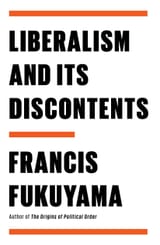Search Results
7/10/2025, 3:32:00 PM
>if Deneen (author of Why Liberalism Failed), MacIntyre, Taylor, and others drawing on thicker anthropologies from the ancient and medieval (or even continental) tradition don't like liberalism and care so much about a "common good" that isn't just the sum of individual utility functions they can just atomize and go live off by themselves. Liberalism gives them that option (after they have paid full taxes for liberalism, let it have total legal authority and final say over their communities, and they have paid for liberal education that involves indoctrination in its views). Just atomize and pursue your own view of the human good bro.
He really missed the point, huh?
He really missed the point, huh?
6/26/2025, 12:41:13 AM
Fukuyama is an improvement on Rawls and Nozick, but I think the problem is that his anthropology remains way too "thin." He adds some sense of thymos (spirit) but still almost wholly excludes logos.
Yet that's the entire lesson of the classical tradition, that thymos must be ordered to logos, or else it destroys itself in pointless competition.
What he is missing is what Plato saw even way back in ancient Athens, that people want what is "truly best" and not what is merely "said to be good by others" (honors, thymos) or what "appears to be good" (the appetites). This is why people are willing to die for ideologies they will never benefit from, or retreat into monasteries and abandon all sensible goods or having a family, etc.
What's funny is that parts of liberalism would actually be bolstered by this recognition, because one could argue that the "market place of ideas" helps us to transcend current opinion and desire. However, because he, like all liberals, is dead set on denying man any telos, he cannot countenance this because then he would have to realize that culture and education need to train people in virtue, that freedom is hard to achieve, that one doesn't just become free by turning 18 and avoiding any particularly bad situations.
He even seems to get this with the example of the young guy who smokes weed and plays vidya while neeting, but his appeal to "character" and virtue remains very thing.
And yet liberalism doesn't deny all telos, it actually just assumes a particular theory of it, with a bad definition of freedom, and then absolutizes its conclusion through an appeal to skepticism and its own ignorance.
Yet that's the entire lesson of the classical tradition, that thymos must be ordered to logos, or else it destroys itself in pointless competition.
What he is missing is what Plato saw even way back in ancient Athens, that people want what is "truly best" and not what is merely "said to be good by others" (honors, thymos) or what "appears to be good" (the appetites). This is why people are willing to die for ideologies they will never benefit from, or retreat into monasteries and abandon all sensible goods or having a family, etc.
What's funny is that parts of liberalism would actually be bolstered by this recognition, because one could argue that the "market place of ideas" helps us to transcend current opinion and desire. However, because he, like all liberals, is dead set on denying man any telos, he cannot countenance this because then he would have to realize that culture and education need to train people in virtue, that freedom is hard to achieve, that one doesn't just become free by turning 18 and avoiding any particularly bad situations.
He even seems to get this with the example of the young guy who smokes weed and plays vidya while neeting, but his appeal to "character" and virtue remains very thing.
And yet liberalism doesn't deny all telos, it actually just assumes a particular theory of it, with a bad definition of freedom, and then absolutizes its conclusion through an appeal to skepticism and its own ignorance.
Page 1
